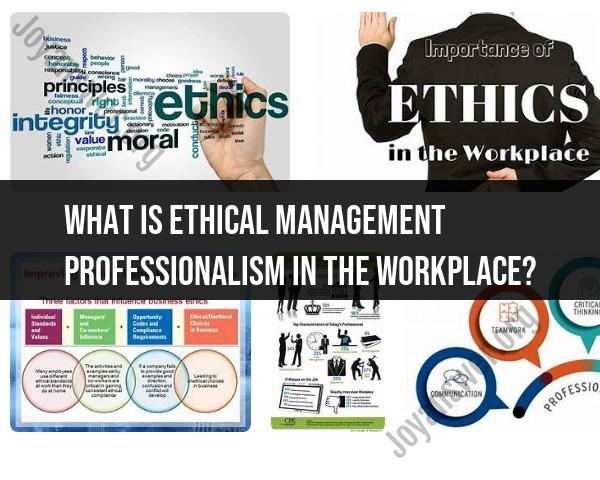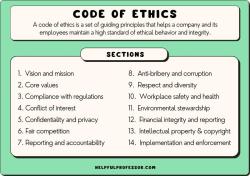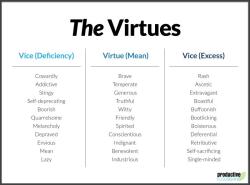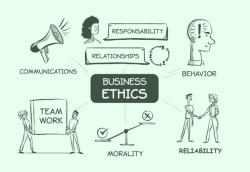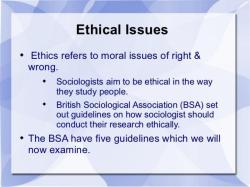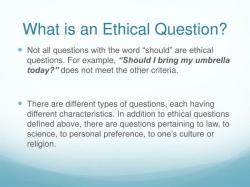What is ethical management professionalism in the workplace?
Ethical management professionalism in the workplace refers to the application of ethical principles and standards in the context of managing and leading individuals or teams within an organization. It involves fostering a work environment that prioritizes integrity, transparency, fairness, and ethical decision-making. Ethical management professionalism encompasses various aspects of leadership and organizational behavior, including:
Integrity and Honesty:
- Ethical management professionals demonstrate honesty and integrity in all interactions. They adhere to high moral and ethical standards, leading by example and setting a foundation for trust within the organization.
Fair Treatment:
- Fairness involves treating all employees equitably and without discrimination. Ethical managers ensure that decisions related to hiring, promotions, evaluations, and disciplinary actions are based on merit and relevant qualifications rather than biases.
Open Communication:
- Ethical management emphasizes open and transparent communication. Leaders share information with employees, encourage open dialogue, and listen to diverse perspectives. Transparent communication builds trust and helps employees understand the rationale behind management decisions.
Respect for Others:
- Ethical managers demonstrate respect for the dignity and rights of every individual in the workplace. This includes respecting cultural differences, promoting inclusivity, and creating an environment free from harassment and discrimination.
Ethical Decision-Making:
- Ethical management involves making decisions that align with moral principles and organizational values. Leaders consider the potential impact of decisions on various stakeholders and strive to make choices that are ethical, even when faced with complex or challenging situations.
Social Responsibility:
- Ethical management extends beyond the organization's boundaries to consider its impact on the broader community and environment. Ethical leaders take steps to ensure the organization acts responsibly and contributes positively to society.
Employee Development and Well-Being:
- Ethical management emphasizes the well-being and professional development of employees. This includes providing a safe and healthy work environment, offering opportunities for skill development, and recognizing and rewarding employee contributions.
Conflict Resolution:
- Ethical managers address conflicts in a fair and constructive manner. They promote resolution through open communication, mediation, and by upholding organizational policies and values.
Adherence to Laws and Regulations:
- Ethical management involves compliance with laws and regulations governing the industry and the workplace. Managers ensure that the organization operates within legal boundaries and encourages employees to do the same.
Long-Term Organizational Sustainability:
- Ethical management takes a long-term perspective, considering the sustainability and success of the organization over time. This may involve strategic planning that prioritizes ethical conduct and responsible business practices.
Accountability:
- Ethical management includes holding oneself and others accountable for their actions. Leaders take responsibility for the outcomes of their decisions and actions and foster a culture of accountability throughout the organization.
Ethical management professionalism creates a positive workplace culture that enhances employee morale, loyalty, and organizational reputation. It contributes to the development of a sustainable and socially responsible business that benefits both internal and external stakeholders.
How does ethical management contribute to professionalism in the workplace?
Ethical management plays a crucial role in fostering professionalism in the workplace in several ways:
1. Building Trust and Respect:
- When leaders and colleagues act with integrity and uphold ethical values, it fosters trust and respect between team members. This creates a positive and collaborative work environment where people feel comfortable expressing themselves, sharing ideas, and working towards common goals.
- Conversely, unethical behavior like favoritism, discrimination, or dishonesty erodes trust and damages working relationships. This can lead to a toxic work environment and hinder professional conduct.
2. Promoting Responsible Decision-Making:
- Ethical management establishes clear guidelines and processes for decision-making, ensuring that ethical considerations are always factored in. This helps employees make informed and responsible choices that align with the organization's values and mission.
- A lack of ethical guidance can lead to impulsive or self-serving decisions that may harm the organization, stakeholders, or even colleagues. This undermines professionalism and can damage the organization's reputation.
3. Encouraging Personal and Professional Growth:
- Ethical managers invest in the development of their employees, providing them with opportunities to learn, grow, and hone their skills. This fosters a sense of ownership and accountability, motivating employees to perform at their best and contribute meaningfully.
- In contrast, exploitative or manipulative management practices demotivate employees and limit their professional development. This hinders professionalism and creates a stagnant work environment.
4. Enhancing Reputation and Brand Image:
- Organizations known for their ethical conduct gain the trust and respect of customers, partners, and the community. This strengthens the organization's reputation and brand image, attracting talented individuals and fostering positive collaborations.
- Unethical practices, on the other hand, can lead to lawsuits, negative publicity, and financial losses. This damages the organization's reputation and hinders its ability to attract and retain top talent.
5. Setting a Positive Example:
- Ethical leaders serve as role models for their employees, demonstrating the importance of professional conduct and ethical decision-making. This sets a positive tone for the entire organization and motivates others to follow suit.
- Employees of unethical leaders are more likely to engage in similar behavior, perpetuating a culture of unprofessionalism and compromising the organization's integrity.
In conclusion, ethical management is not just about compliance; it's about creating a work environment that fosters professionalism, trust, and mutual respect. By prioritizing ethical conduct, organizations can attract and retain talented individuals, enhance their reputation, and achieve sustainable success.
I hope this provides a clear and insightful perspective on how ethical management contributes to professionalism in the workplace. Please feel free to ask any further questions you may have!
